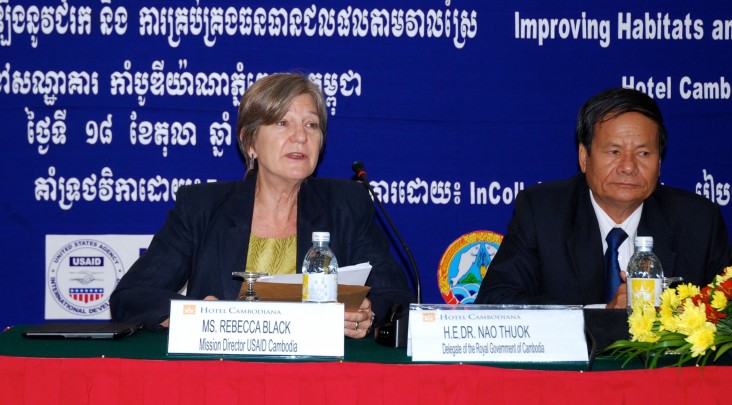Home » News & Information » Speeches » Remarks by Rebecca Black for the Rice Field Fisheries Enhancement Project Lessons Learned Workshop
Friday, October 18, 2013

USAID Cambodia Mission Director Rebecca Black (left) delivers opening remarks at the Lessons Learned Workshop for the Rice Field Fisheries Enhancement Project in Phnom Penh, Cambodia on October 18, 2013.
USAID/Michael Gebremedhin
Lessons Learned and Experiences from the Rice Field Fisheries Enhancement Project
Remarks by Rebecca Black, USAID Mission Director
Cambodiana Hotel, October 18, 2013
(as delivered)
• Your excellency Dr. Nao Thouk, Director General of The Cambodian Fisheries Administration
• Mr. Alan Brooks
• Ladies and gentlemen
It gives me great pleasure to join you here today. Fish and fisheries are of vital importance to this country. We all know that fish is Cambodia’s most important source of animal protein. But fish also represents 25% of the country’s agricultural value. If we can help increase and sustain the availability of this important resource – we tackle nutrition and poverty head on.
USAID Cambodia is implementing one of President Obama’s key initiatives, Feed the Future to fight global hunger and malnutrition and help communities pull themselves out of poverty. Nowhere is this more important than here in Cambodia. We know that malnutrition and lack of early child development continues to hold back the country’s children. We also know that one out of four Cambodians lives below the poverty line and many more very close to the line. Think about what kind of opportunities await once we eliminate these challenges.
I am proud to say that Feed the Future is working hard at doing just that, all over the world. Over the last year 7.5 million people around the globe adopted new techniques to grow food and their incomes as a result of U.S. government support. Nearly 4 million hectares of land are now under improved cultivation and management practices. The value of exports of certain agricultural commodities increased in value by $84 million and the value of agricultural and rural loans grew by more than $150 million. We are proud of these achievements but we know our work is not finished.
Achievements like these happen because of great partnerships. Given the importance of fish to Cambodia, I want to recognize the tremendous commitment shown by Dr. Nao Thouk and the Royal Government of Cambodia to preserving this important resource. Encouraging the creation of Community Fisheries Refuges throughout the country will help increase incomes and improve nutrition. Thank you, sir, for your commitment to this important cause.
This type of community-led effort is exactly the type of activity that will offer the best protection to Cambodia’s fish supply from the effects of climate change as well as the impact from dam projects both in and outside of Cambodia. USAID is committed to these initiatives because we realize just how important they are.
That’s also why we working with WorldFish on this project. WorldFish is a member of the Consultative Group on International Agricultural Research – or CGIAR Consortium – a body dedicated to conducting research to reducing rural poverty, increasing food security, improving human health and nutrition, and ensuring more sustainable management of natural resources. CGIAR’s 15 Research Centers – of which WorldFish is one - generate and disseminate critical knowledge, technologies, and policies for agricultural development. USAID has been a longtime supporter of the CGIAR network, using its applied research.
Research, lessons learned, experiences analyzed – these will all help us do better for Cambodia. The Rice Field Fisheries Enhancement Project is undertaking just that kind of evidence search at 40 different sites in four different provinces. We look forward to applying this information as we move forward in our efforts to reduce hunger and poverty.
Thank you.
Issuing Country
Related Speeches
- Remarks by Polly Dunford, Mission Director, USAID Cambodia, Launch Event of Feed the Future Cambodia Harvest II
- Remarks by Christina Lau, Deputy Director, Office of Public Health and Education, USAID/Cambodia, Opening Ceremony of the Kick-Off Workshop for “One Health Workforce”
- Remarks by Veena Reddy, Deputy Mission Director, USAID Cambodia, EPIC Showcase







Comment
Make a general inquiry or suggest an improvement.